Mary Soderstrom's Blog, page 69
January 6, 2014
The Gospel of Malcom: Sowing Seeds of Change without Seeming to
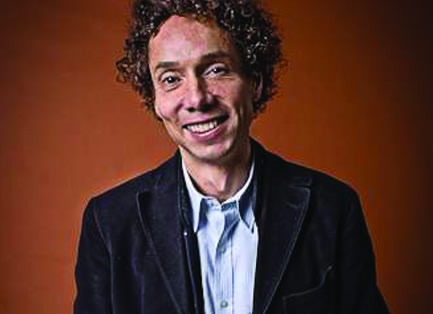 It took me a while to figure out where Malcolm Gladwell's new book
David and Goliath
fits into the brilliant populizer's world view. The book documents through the stories of several interesting people just how advantages are not necessarily what we think they are.
It took me a while to figure out where Malcolm Gladwell's new book
David and Goliath
fits into the brilliant populizer's world view. The book documents through the stories of several interesting people just how advantages are not necessarily what we think they are.It has its roots in an article that Galdwell wrote for The New Yorker four years ago about a geeky Silicon Valley dad who coached his daughter's basketball team to victory by insisting on a full-court press every time. By playing in-your-face ball, the "little blonde girls" overcame teams who were more talented but who didn't keep up the pressure. Davids, Gladwell shows, beats Goliaths nearly three-quarters of the time if he plays the unexpected, and plays it hard.
This uplifting message sounds like vintage Gladwell, but the book also deals with such questions as (according to the bumph on Gladwell's webpage) "When is a traumatic childhood a good thing? When does a disability leave someone better off? Do you really want your child to go to the best school he or she can get into? Why are the childhoods of people at the top of one profession after another marked by deprivation and struggle?"
The question these questions prompt is: has Gladwell written a self-help book, a companion to the many volumes about the good habits of the rich and successful?
The book also contains a fair amount of Biblical quotations, and at first I was inclined to think the answer to the queston was "Yes." But neither this book nor many of his lectures are addressed at people like me. As with his other books, he has markets other than that of leftish intellectuals.
His first book The Tipping Point started out as “The Cool Hunt,” a New Yorker piece examining how trends start, how styles race through society like epidemics. “A must read for any marketing professional,” according to its lead review on Amazon.com, the book can be read as a guide to getting people to buy or to act: small groups work best, pick plugged-in spokesmen, work to make your message “sticky.”
His second book, Blink, considers how we’re hard-wired to react instantaneously, which was great for our ancestors back on the savannah when a lion might suddenly roar nearby. In our fast-paced life today that’s not so good: culturally-engrained prejudices can trump reasoned evaluations in tight situations. Social contexts should be changed so we’re not forced to rely on first impressions, he writes. That’s good for creativity—and also social justice.
In Outliers he argues that success itself is based on a mixture of chance and hard work. Change the rules to make the playing field more level — don’t throw all the kids born in a calendar year together when they start a sport, for example, because that gives the ones born in January a big leg up over those born in December. Then tweak the cultural context to value hard work, and you increase the chance of success exponentially. The result will be more “outliers,” people whose accomplishment is extraordinarily high.
Here he has take-home messages for rich folk who worry about their kids--too much money can be as bad as too little--as well as those who want to punish crime. agressively. Forgiveness is more effective than vindictiveness, he says: after a certain point being tougher makes things worth.And maybe--this point just floats there without being hammered home--some people make just too damn much money and we'd all be better off in a more egalitarian economic system.
None of that is news to me, but it may be for some of the people who pick up the book because they want the real story behind David and Goliath or advice on how to pick a university for your kid (the top school is not always the best one.) If so Gladwell will have succeeded again sowing the seeds for social change without seeming to try to do so.
Published on January 06, 2014 16:21
January 5, 2014
Saturday Photo: Magnificent Resistance
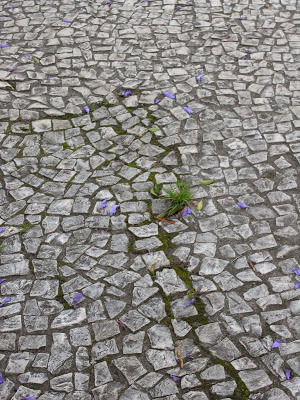 Grass growing in paving at the Oscar Neimeyer Museum in Curitiba, with display of jacaranda petals.
Grass growing in paving at the Oscar Neimeyer Museum in Curitiba, with display of jacaranda petals.Let 2014 be a year in which our resistance to what's wrong be just as strong.
Published on January 05, 2014 12:04
January 3, 2014
Cold and Heat: Burning Hydrocarbons
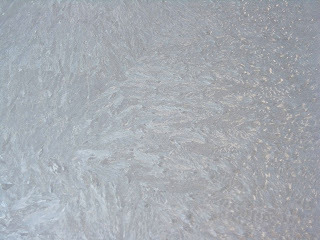 It's cold all over the country right now, weather that usually comes in February here, but which has been with us for more or less two weeks. I'm not one to complain too much--a sunny, icy day after a snow fall is quite beautiful--but as the furnace slurps up oil in the basement, I can't help thinking of what that means in the larger picture.
It's cold all over the country right now, weather that usually comes in February here, but which has been with us for more or less two weeks. I'm not one to complain too much--a sunny, icy day after a snow fall is quite beautiful--but as the furnace slurps up oil in the basement, I can't help thinking of what that means in the larger picture.The air is cleaner now in winter than it was when we came to Montreal. At the time there still were coal furnaces, fewer restrictions on burning (our first apartment had a trash shoot that went to the basement where the super regularly burned our garbage), oil refineries off-gassing in the middle of the night, and no anti-pollution measures for cars.
But there are more cars, more people, and probably more furnaces than then. Small particulate matter from fireplaces and wood stoves has become a problem, and measures are afoot to replace existing ones while you can't put one in new construction.
And on days like today, we want our oil or our natural gas, or our electricity to keep up warm.
Where that energy is coming from is a big question. From the Bakken fields in North Dakota where oil from schist is full of inflammable contaminants (see the explosions in Lac Mégantic and Casselton, ND) in some cases. In all cases, the methods of extraction and transport are far from cost-less.
Okay. So what do we do? Building more densely is certainly part of the answer since not only do dense neighborhoods cut down on transportation cost for people, they also mean more heat conservation because attached or semi-detached buildings have fewer surfaces through which to lose heat.
There's more to say, but right now I think I'll warm up my hands on the radiator.
NB: the photo is of the ice on a double window. Baby, it's cold outside.
Published on January 03, 2014 06:45
January 1, 2014
The Sun in 2014!
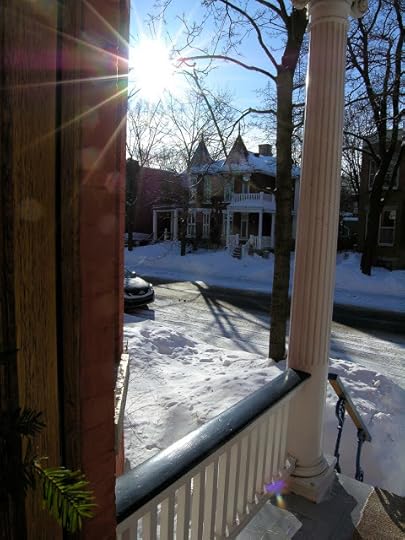 The sun is shining on the snow on this New Year's morning 2014.
The sun is shining on the snow on this New Year's morning 2014.Best wishes to you all.
If you missed this, here's the blog with our holiday news.
Published on January 01, 2014 08:41
December 23, 2013
Signing off for the Holiday: See You in the New Year
 Barring the unforeseen, I expect to be too busy having fun to doing any posting. So here's a link to our Christmas blog in the meantime.
Barring the unforeseen, I expect to be too busy having fun to doing any posting. So here's a link to our Christmas blog in the meantime.
Published on December 23, 2013 17:37
December 21, 2013
Saturday Photo: Celebrating in Cuzco
 This was taken in a Cuzco grocery store, which a month ago was already decked out for Christmas. Love the idea of locals dancing to Andean harps while it's summer outside.
This was taken in a Cuzco grocery store, which a month ago was already decked out for Christmas. Love the idea of locals dancing to Andean harps while it's summer outside.
Published on December 21, 2013 14:17
Music that Goes Beyond the Season
Okay, this seems to be an ad for a supermarket chain, wrapped in a tribute to Nelson Mandela, but it really is lovely.
Published on December 21, 2013 06:20
December 18, 2013
Educating Kids in Science, Math and Reading--and Making Sure They Get a Good Start from the Beginning
The New York Times analyzes why American school kids performed in such a mediocre fashion on the recnet OECD school success rankings. Three regions are singled out for comment: Shanghai where an effort is being made to equalize opportunitiy for kids, Canada where many provinces don't use property taxes to fund schools, but provincial revenues, and Finland, which seems to be doing just about everything right.
The take-home lesson is that giving schools equal fiunding and making sure that every kid has access to decent schools are important. Income inequality is deadly. Residential segregation doesn't help the overall performance of a nation's young. Investing in common goals produce results.
One of the things that is not mentioned is the way that Finland looks out for its offspring from the very begininng. For 75 years Finnish families have been receiving a "baby box" which provides just about everything a small child needs in its earliest days--."bodysuits, a sleeping bag, outdoor gear, bathing products for the baby, as well as nappies, bedding and a small mattress.
"With the mattress in the bottom, the box becomes a baby's first bed. Many children, from all social backgrounds, have their first naps within the safety of the box's four cardboard walls.
"Mothers have a choice between taking the box, or a cash grant, currently set at 140 euros, but 95% opt for the box as it's worth much more."
And, as the mother in this clip from the BBC notes, little kids are often dressed in the same clothes which helps even things out. The items are of good quality too: she says that her mother saved her baby box, and the sheets are still good enough to use for a new baby today.
The take-home lesson is that giving schools equal fiunding and making sure that every kid has access to decent schools are important. Income inequality is deadly. Residential segregation doesn't help the overall performance of a nation's young. Investing in common goals produce results.
One of the things that is not mentioned is the way that Finland looks out for its offspring from the very begininng. For 75 years Finnish families have been receiving a "baby box" which provides just about everything a small child needs in its earliest days--."bodysuits, a sleeping bag, outdoor gear, bathing products for the baby, as well as nappies, bedding and a small mattress.
"With the mattress in the bottom, the box becomes a baby's first bed. Many children, from all social backgrounds, have their first naps within the safety of the box's four cardboard walls.
"Mothers have a choice between taking the box, or a cash grant, currently set at 140 euros, but 95% opt for the box as it's worth much more."
And, as the mother in this clip from the BBC notes, little kids are often dressed in the same clothes which helps even things out. The items are of good quality too: she says that her mother saved her baby box, and the sheets are still good enough to use for a new baby today.
Published on December 18, 2013 17:15
December 17, 2013
Christmas Songs from Brazil...
As I try to get back to work, how about this for the run up to Christmas
Published on December 17, 2013 10:48
December 16, 2013
Not Politics, Just Pastry Today
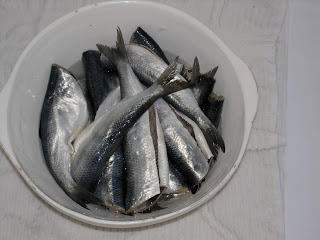 Or maybe just food. I spent the morning making making 10 dozen spritz butter cookies and cutting up 30 salt herring to put in marinade for pickled herring.
Or maybe just food. I spent the morning making making 10 dozen spritz butter cookies and cutting up 30 salt herring to put in marinade for pickled herring.Yesterday it was another 10 dozen papporkakor.
Now to go out in the snowy streets to look for more holiday stuff....
Published on December 16, 2013 11:26



